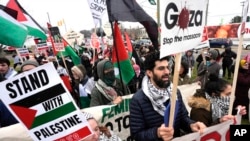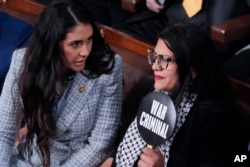America's voting landscape is shifting. While many still cast ballots at local polls, mail-in voting is on the rise. Once limited to military personnel and homebound citizens, it's now the primary method in several states.
2024 US Election
Thursday 3 October 2024

Major Muslim and Arab American organizations and pro-Palestinian activist groups say they were excluded from Vice President Kamala Harris’ office's outreach to community leaders on the administration's efforts to contain the widening conflict in the Middle East.
The White House said Wednesday that Phil Gordon, Harris' national security adviser, met virtually with "Muslim, Arab, and Palestinian American community leaders from across the United States," to discuss administration efforts to end the war in Gaza.
In a statement, the White House said Gordon "expressed concern for civilians in Lebanon," and Israeli "actions that undermine peace, security, and stability in the West Bank."
The meeting appears to have been an attempt to repair ties with Arab, Palestinian and Muslim communities outraged over the administration's continued support for Israel in the war against Hamas, which has taken the lives of tens of thousands of Palestinian civilians and left an ongoing humanitarian crisis in Gaza.
However, none of the major community groups, including the Council on American-Islamic Relations and the Muslim Public Affairs Council, were invited. Neither were the Uncommitted National Movement and Abandon Harris, the two pro-Palestinian activist groups that have been pushing for change in the administration's policies on Gaza.
Community leaders of prominent groups in the Washington area, including MakeSpace, the Dar Al Hijrah Islamic Center, the Mustafa Center and the Diyanet Center of America were also not invited.
James Zogby, president of the Arab American Institute, participated in the eight-person engagement with Gordon. He said the meeting was "irritating," as it did not include representatives of the community.
"We were told an Arab American meeting. We were told a Muslim meeting. It was none of the above," Zogby told VOA. "There were no Palestinian leaders. There were some Palestinian Americans, but there were no organizations representing Palestinian Americans."
Zogby said he felt "blindsided" by the event, characterizing it as a "check the box" engagement with the community. He said the administration missed an opportunity by not inviting the list of people the community had recommended to be included.
"There were only two of us out of the eight who headed any organization at all," he said.
Edward Gabriel, president of the American Task Force on Lebanon, said the vice president's office has engaged him in "nearly a dozen" meetings, including the one with Gordon this week.
"Our meetings continue to be positive," he wrote to VOA. "We have expressed to the Vice President and her team the importance of now providing our community with a clear message on the need for ending this war and helping those Lebanese citizens most affected by the conflict."
In the past two weeks, Israel's military campaign targeting Iran-backed Hezbollah militants in Lebanon has killed hundreds, wounded thousands and displaced more than a million people. The victims include Kamel Ahmad Jawad, an American from Dearborn, Michigan.
Gabriel said that Biden's stance on the widening of Israel's campaign to Lebanon to date "has not been well received by the Lebanese American community, as there was no sense of compassion expressed for the loss of life of innocent citizens, especially women and children."
The White House and the vice president's office did not respond to VOA's queries. However, a campaign spokesperson said Harris is "committed to work to earn every vote, unite our country, and to be a president for all Americans."
"Throughout her career, Vice President Harris has been steadfast in her support of our country's diverse Muslim community, ensuring first and foremost that they can live free from the hateful policies of the Trump administration," the spokesperson told VOA. "She will continue working to bring the war in Gaza to an end in a way where Israel is secure, the hostages are released, the suffering in Gaza ends, and the Palestinian people can realize their right to dignity, security, freedom and self-determination."
Virtually tied
Harris' outreach efforts come as a new poll indicates Arab American support for the Democratic presidential nominee is virtually tied with that for former President and Republican Party nominee Donald Trump.
The Arab American Institute released Wednesday a nationwide poll of 500 Arab American registered voters that indicates support for Trump stands at 42% and Harris 41%.
Among those who say they are very likely to vote, Trump leads Harris 46% to 42%.
The poll suggests the administration's handling of the crisis in Gaza has eroded the community's support for Democrats, whom they traditionally back. Arab Americans now are evenly divided between the two parties: 38% for each.
The United States is home to roughly 3.5 million Arab Americans, according to the latest census. The U.S. Census Bureau does not count population based on religious beliefs, but various sources show an estimated 4 million to 6 million Muslim Americans.
That is a very small percentage of the 337 million total U.S. population. However, since Arab Americans are concentrated in a few states, such as California and Michigan, they may play an outsized role in next month’s election.
This may be seen especially in Michigan, a battleground state with the largest percentage of Arab Americans that Biden won in 2020 with only 154,000 votes more than Trump. In 2016, Trump won the state over Hillary Clinton by just under 11,000 votes.
More than 100,000 Michiganders voted "uncommitted" in the Democratic primary election to protest the Biden administration's support of Israel's military campaign — votes that could be up for grabs for Trump.
Trump courting the community
Trump has been courting Arab and Muslim voters and has won the support of Amer Ghalib, the Yemeni American mayor of Hamtramck, Michigan. The city is home to 30,000 people, almost half of them Muslim, and is the only city in the country to have an all-Muslim city council.
"Endorsing President Trump was a combination of disappointment and hope," Ghalib told VOA. "Disappointed at the current administration's policies domestically and internationally, and in hope that President Trump will come to fix things up, end the chaos in the Middle East and restore peace everywhere, as well as preventing our economy from further deterioration."
Ghalib's endorsement, came last month following his meeting with Trump, who held a campaign event in the nearby city of Flint.
On cultural issues such as LGBTQ+ rights and the right to abortion, Ghalib and many of his constituents are more aligned with the Republican Party. He has supported conservative measures taken by his city council, including a 2023 ban on Pride flags on city property — a move that angered allies and members of the LGBTQ+ community.
"The cultural issues are important to some," Zogby said. Wanting to "punish Democrats" over Gaza is another motivator for the community, he added.
"I don't think that there's anyone actually very seriously considering that Donald Trump is better than Kamala Harris on the Middle East," he said. "It's a question of, they might be both terrible. That's, I think, the more prevalent view."
VOA’s United Nations correspondent Margaret Besheer, VOA reporters Sayed Aziz Rahman and Begum Ersoz contributed to this report.


























